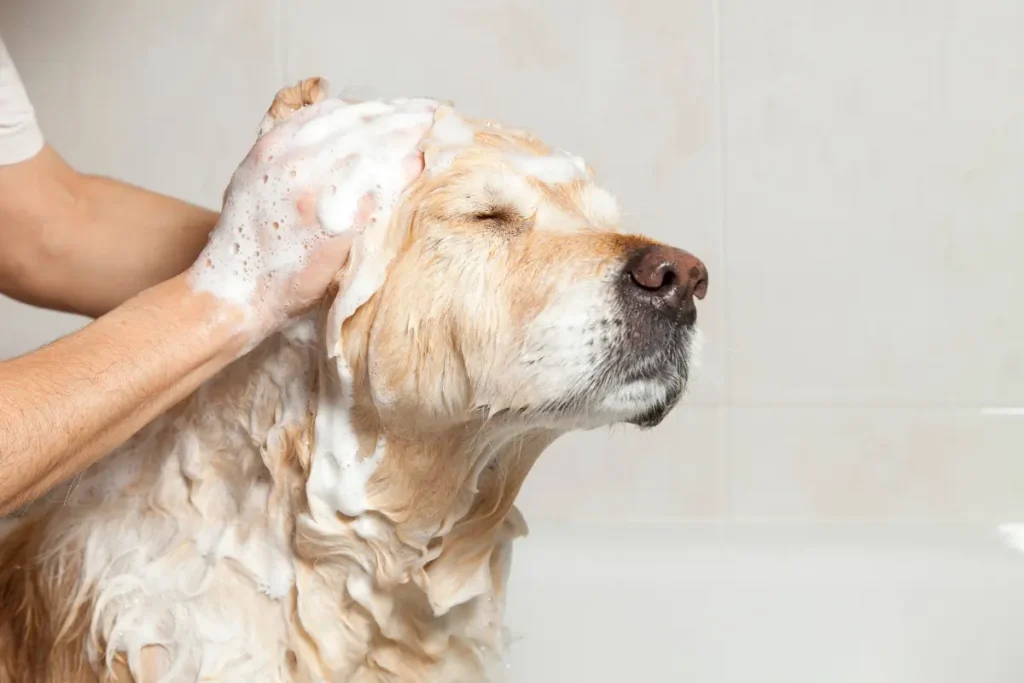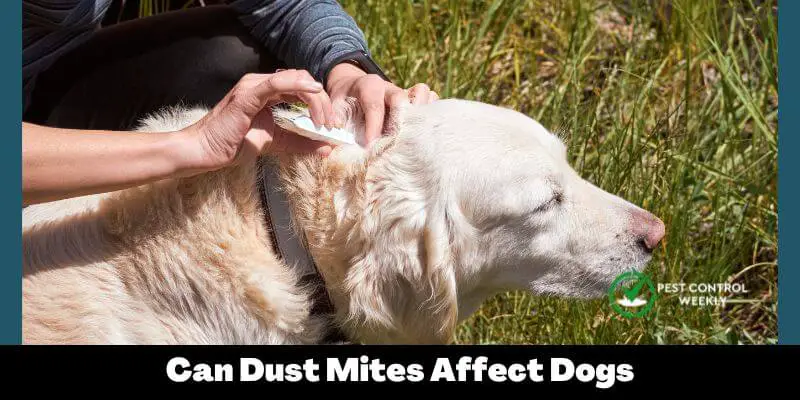Dust mites are tiny arthropods that are widely prevalent in your surroundings and are around you. Dust mites affect humans and animals alike, but can dust mites affect dogs?
Yes, dust mites can affect dogs. They cause infestation by crawling on their skin in large numbers and sucking on their blood. As a result, the dogs start to fall sick and develop skin conditions.
In this article, we will read through how mites affect dogs and what can be done to save your pet animals from the mite problem. You can read through the guidelines to protect your dogs. Happy reading!
Dust Mite Allergies In Dogs

Animals get allergies just like humans, sometimes from foods like fish and grain, corn, and other small insects like fleas, dander, mites, and pollen. Dust mite allergies are caused by small spider-like creatures which are not easily visible to the naked eye.
There are two ways by which mite allergy can be initiated in dogs. The first one is by contact. In this, the mites will inhabit and cling to the dog’s skin beneath all its hair. The second one is through inhalation. In this, the mites can be breathed in and can occupy the lungs.
The dogs can be infested in both ways. The dogs can inhale even the dead mites, and an allergic reaction can start. You have to adapt to deep cleaning methods to make your house completely mite-free.
How Do You Know If Your Dog Has Dust Mites?
The signs and symptoms reveal the presence and absence of dust mites in the dogs. All you have to do is keep an eye out and look closely at the dog’s behavior. The symptoms are as follows:
- Licking Excessively
- Itching
- Agitation
- Lots of skin scratching by legs
- Presence of crusty skin
- Bald patches on the body
- Running nose
- Water eyes that appear red in color
- Sneezing frequently
- Anaphylaxis
Sometimes the dogs develop a severe reaction against the dust mites, which may cause inflammation in the airways, constricting their bronchioles and making breathing difficult for the dog. If you notice your dog wheezing, that is your cue to take your animal to a nearby vet clinic.
Are Dust Mites Harmful To Dogs?
Yes, dust mites are harmful to dogs and occur more in some species than others. For instance, there is a high prevalence of mites in breeds like bulldogs, german shepherds, pugs, setters, schnauzers, and terriers.
Dust mites are a common allergen for dogs, but if their numbers are exceedingly high, they start causing diseases in the dogs.
Can Mites Make A Dog Sick?

Mites are capable of burrowing deep into a dog’s skin and can lead to inflammation followed by irritation in dogs. They have become a health concern with the passage of time. Not only can they cause an allergic reaction but they can also lead to hair loss and constant dry skin in dogs.
What Causes Dust Mites In Dogs?

It is basically the environment that causes dust mites in the dogs. The dogs are out in the soil all day long, exposed to all sorts of insects and other animals. If the soil or any other animal has dust mites, it increases the chances of contracting dust mites.
Furthermore, a dog is able to get infested by alive as well as dead dust mites. Similarly, if one part of the body has been infested with dust mites, they may spread to other parts of the body or the other dogs as well.
Last but not least, the waste of dust mites is also sufficient to initiate an infestation as the waste has eggs that hatch upon optimum temperature conditions. Thus, getting rid of mites can be constant hard work for the god owners.
How Do I Treat My Dog For Dust Mites?
There are several ways in which you can treat your dog for dust mites. This includes the methods as stated below:
1- Hot Water Bath

The dogs must be bathed in water that has a higher temperature than lukewarm water if the use of detergent and soaps is highly recommended while doing so. This will help in deep cleaning a dog’s hair. Frequent baths are encouraged to eliminate the mites present in the dog’s body.
2- Keeping Dogs Kennel Clean

The kennels must be cleaned and washed thoroughly with water and disinfectants. The mite sprays must be used frequently so that the mites are eliminated from the place where a dog sleeps. Moreover, if you have bedding for your dog, you need to wash it in hot water. It is better if you get it replaced by a new one.
3- Do Not Keep Foods In Kennels
It is better to avoid keeping food items that attract the mites from coming inside the kennels again and again. Once a dog has eaten, make sure to clear out the leftovers to create a hygienic environment for dogs. A clean environment discourages the spread of mites.
4- Use Of ImmunoTherapy Injections

These injections are administered by a veterinary doctor which will desensitize your dogs toward the mites. It is kind of like a passive vaccination procedure for dogs. It can prevent them from getting sick due to dust mite allergies. The number of injections to be given is determined by the vet himself.
Wrapping It Up
Dust mites are widely prevalent in our surroundings and dogs can get allergies due to them easily. Whether the mites are dead or alive, they are capable of causing allergies in dogs. It can be hard to get rid of mites but you can do this by adopting preventive strategies.
These include the cleanliness of kennels along with the use of disinfectants. You must also take your dog to the nearest vet to monitor the skin condition. Moreover, immune therapy injections are suggested so that your dog does not develop anaphylaxis from dust mites.
References
Moog F, Brun J, Bourdeau P, Cadiergues MC. Clinical, Parasitological, and Serological Follow-Up of Dogs with Sarcoptic Mange Treated Orally with Lotilaner. Case Rep Vet Med. 2021 Jan 25;2021.
Fernández-Caldas E: On Mite Allergy in Dogs and Humans. Int Arch Allergy Immunol 2013;160:329-330.
Chan SK, Leung DYM. Dog and Cat Allergies: Current State of Diagnostic Approaches and Challenges. Allergy Asthma Immunol Res. 2018 Mar.

